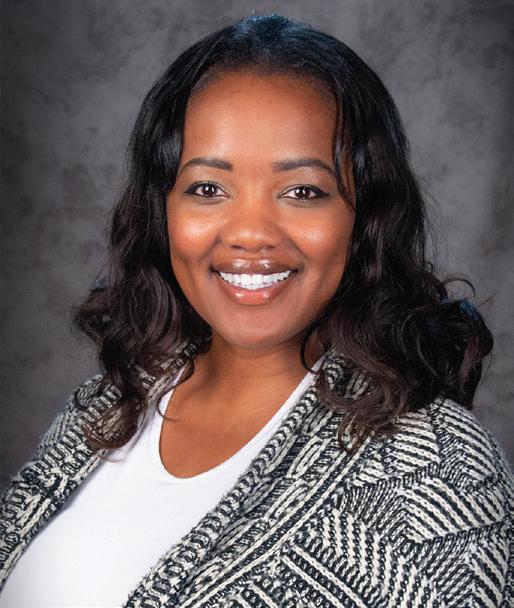
7 minute read
Healthcare Professions
erhaps at no time in recent history has the need for qualified healthcare workers been more starkly apparent than during the COVID-19 crisis of 2020. P The health safety crisis dominated headlines and shone a spotlight on the critical and growing need for health care professionals in a variety of fields. Across Albany and Southwest Georgia, practitioners and educators are making the investment to grow and strengthen the health worker pipeline with state-of-the-art education and training to ensure that southwest Georgia’s medical care options are among the best in the region.
PHOEBE PUTNEY HEALTH SYSTEM
Advertisement
Planning and construction of the new Phoebe Simulation and Innovation Center, designed to be a hub for a one-ofa-kind Nursing Simulation and Training Education Program (NSTEP) Phoebe developed to support new graduate nurses, welcomed its first group of nurses for training in June. The $5.3 million, 22,000-square-foot center employs the latest technology in high-fidelity medical mannequins. It contains multiple training rooms – including an operating/trauma room, a traditional hospital room, an intensive care unit room, and a labor and delivery suite which contains a neonatal intensive care unit – all set up to emulate the actual facilities in which Phoebe staff work.
HEALTHCARE PROFESSIONS: LOCAL STRIDES TO BUILD WORKFORCE
We are able to do everything from allowing a novice nurse to practice inserting a peripheral intravenous line to simulating a difficult premature “ birth for an entire labor and delivery and NICU team,” said the center’s manager, Larecia Gill, PHD, RN. “
“By allowing our staff to train using simulation, they are in a ‘safe’ environment that will help improve their clinical competency and confidence in delivering safe, quality healthcare which will improve patient safety and reduce healthcare costs.”
Although planning and construction for the center began well before the COVID-19 outbreak, its advantages have become even more strongly evident since.
“Unfortunately, the COVID-19 pandemic limited clinical rotations for spring and summer nursing graduates, and they were unable to get all the hands-on training they need. Our new center is ideal for cultivating that supplemental learning,” said Phoebe Assistant Vice President of Nursing Education Tracy Suber, Ed.D., RN.
Individual training scenarios focus on numerous aspects of care, including lessons learned while caring for COVID-19 patients. Trainees are asked to think critically and act quickly during sessions that are recorded. An important part of the training is the debriefing, where expert educators review the recorded scenario to reinforce what may have gone right or wrong to prevent errors in the future.
“This center is an incredible investment in patient safety and workforce development. Staff throughout our health system will utilize the center year-round for realistic training that will enhance the quality of care we are able to provide,” said Suber. “It will also be a great benefit for our employees and will help us recruit and retain outstanding workers.”
TRACY SUBER, ED.D, RN, ASSISTANT VICE PRESIDENT OF NURSING EDUCATION AT PHOEBE.
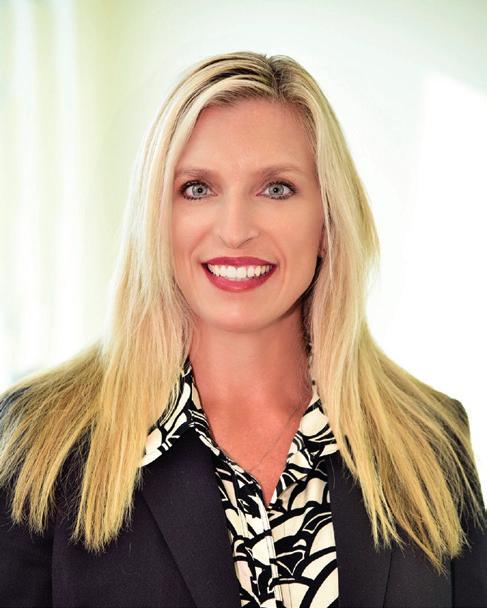
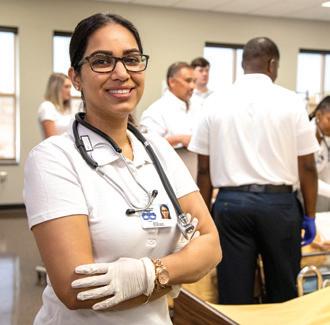
Plans for a new 20,000-squarefoot advanced Simulation Center for Nursing and Allied Health are underway at ASU.
ALBANY STATE UNIVERSITY
Albany State University (ASU) will soon have a simulation center of its own. The school has been appropriated $800,000 in design funds from the Georgia General Assembly to begin planning for the construction of a new 20,000-square-foot advanced Simulation Center for Nursing and Allied Health. With one-third of ASU’s degrees conferred in nursing and allied health disciplines, the proposed simulation center will both support existing enrollment and allow growth for the university’s health professions programs. The simulation center will include space for simulation labs with low, medium and high-fidelity manikins, control rooms, and observation spaces, as well as related hospital simulation spaces and work areas.
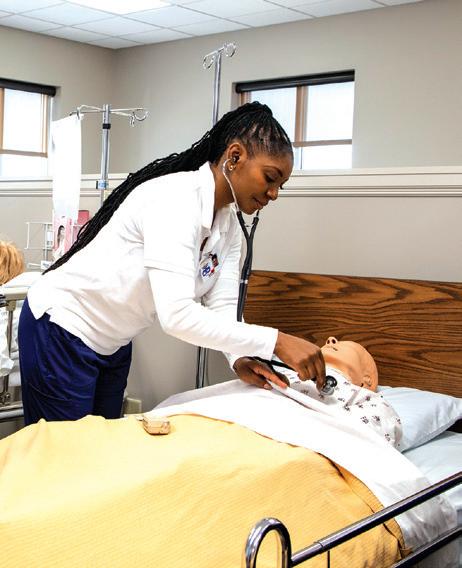
The Simulation Center is a part of the University System of Georgia’s (USG) Strategic Plan 2024. One of USG’s goals is to increase the number of graduates in health professions. The center is also part of ASU’s 2020-2025 strategic plan, which includes the goal of engaging regional health career partners to determine prevalent health challenges of Southwest Georgia and implementing best practices that strengthen programs and services to address the learning needs of students.
The center will support the nursing program expansion at Albany State and provide opportunities for collaboration with other USG schools, the Technical College System of Georgia and private nursing and allied health programs. While addressing the challenge of clinical student placements in acute care settings, USG will also enhance the state’s nursing pipeline through the center at Albany State.
ASU can effectively alleviate the shortage of qualified nurses in Georgia,” said Dr. Sarah Brinson, Dean of the Darton College of Health Professions. “ “
"This center will play a key role in improving patient care and outcomes, which is proven to be measurably enhanced by simulation training.”
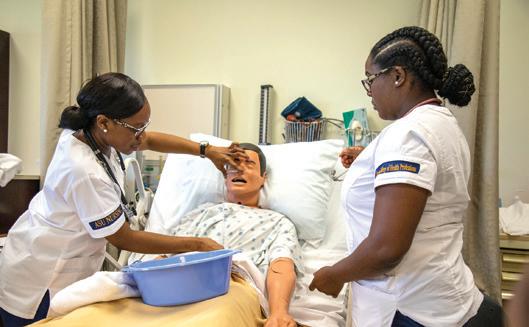
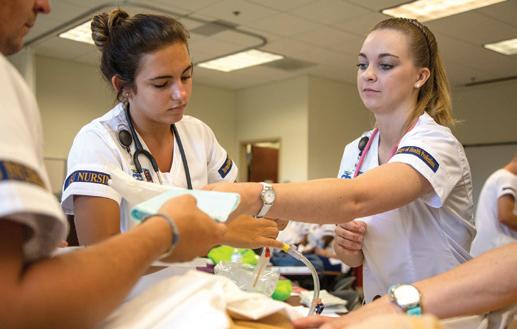
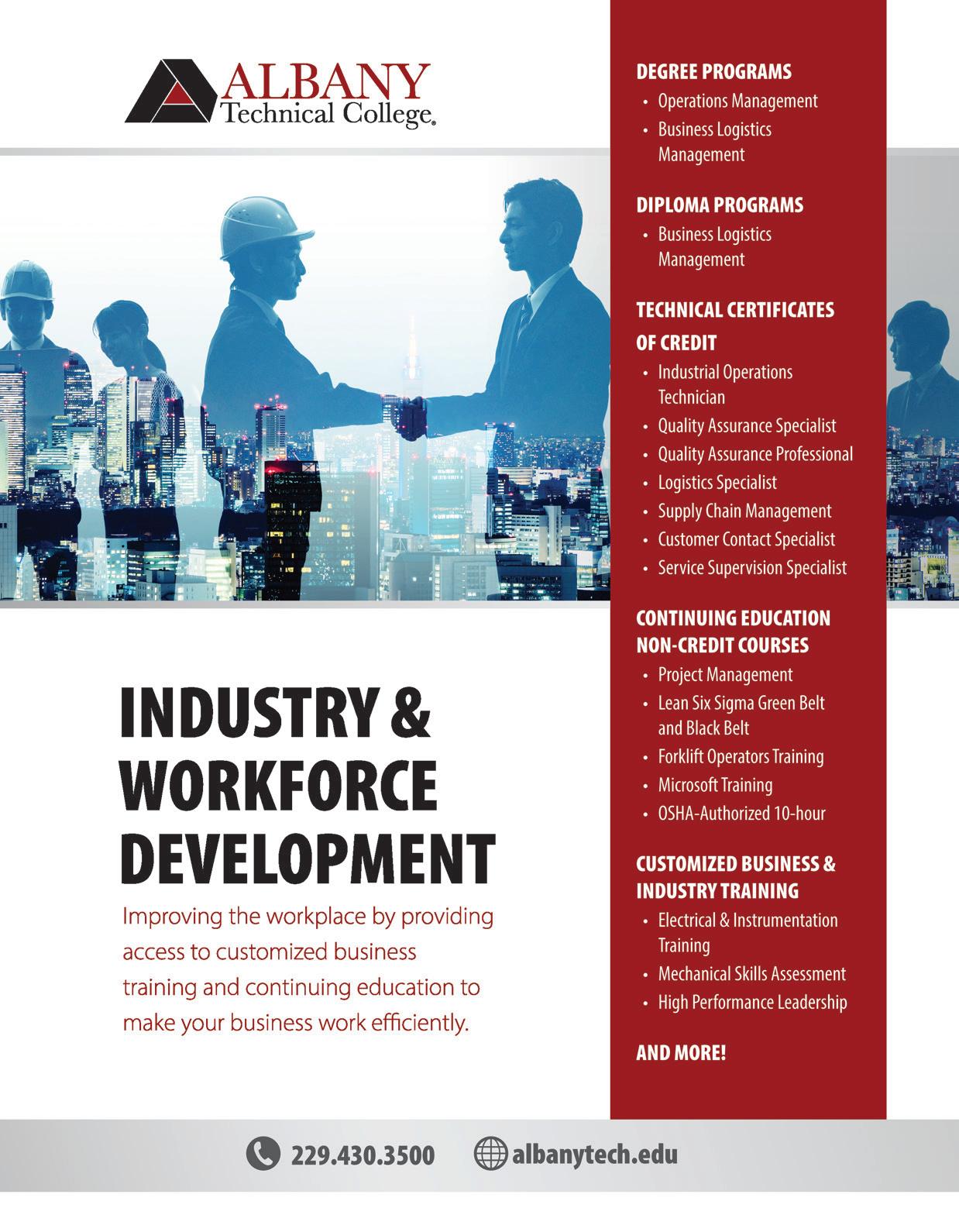
ALBANY TECHNICAL COLLEGE
At Albany Technical College (ATC), strides are also being made to train medical workers for the area.
“As a technical college, meeting the needs of our local and regional workforces is constantly in the forefront of our minds,” said Lisa Stephens, Dean of Healthcare/Business Technology. “We know, for example, that there is a real need for not only nurses but for all allied health professionals.”
According to the U.S. Bureau for Labor Statistics, Employment in nursing is projected to grow 11 percent from 2018 to 2028, much faster than the average for all occupations. As the babyboom population ages, the overall need for healthcare services is expected to increase. More nurses will be needed in residential care facilities and in-home health environments to care for older patients.
To help meet that need, Albany Technical College is in the process of expanding the Associate of Science Nursing Program, which has traditionally been offered on nights and weekends, to a day program as well. This program at ATC is already a successful one, with spring graduates all achieving a 100% pass rate on their standardized tests. The NCLEX exam, also known as the National Council Licensure Examination, is a standardized test that every ATC spring graduates all achieved a 100% pass rate on their standardized tests.

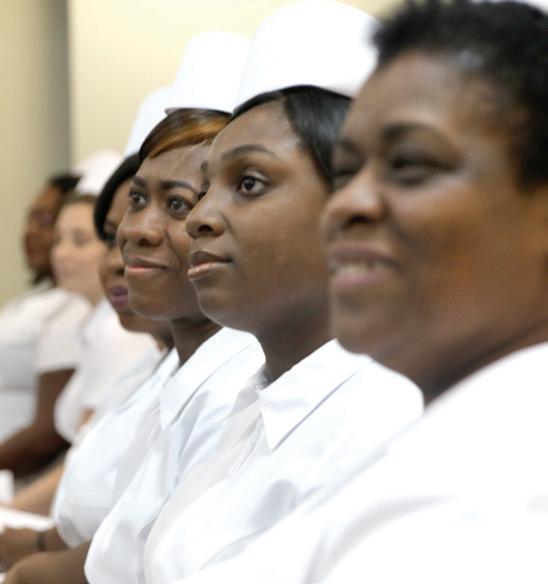
From here. For here.
Here is where we’re from. Here made us who we are. We believe relationships are worth more than dollars can measure. It’s a value that grows over time, strengthens under pressure, and thrives when serving others. And, we’re glad to be here.
1-888-SYNOVUS synovus.com
state regulatory board uses to determine if a candidate is ready to become licensed as an entry-level nurse.
In addition, ATC’s Practical Nursing Program, which was ranked sixth out of 21 in the state for 2020 by PracticalNursing.org, is in the process of becoming accredited. For the award, nursing programs were assessed on several factors that represent how well a program supports students towards licensure and beyond. PracticalNursing.org analyzed past and present first time NCLEX-PN “pass-rates” weighted by year. The pass rates are looked at as one of the best measures to determine a nursing program’s student preparedness.
To be selected as number six in the top 10 PN nursing programs in the state of Georgia is truly an honor,” said Teresa Darity, Chair/Instructor Practical Nursing at Albany Tech. “ “
“We attribute this distinction to a devoted nursing faculty and staff, who are focused on ensuring student success. The credit also goes to our committed and hard-working students that we proudly assist in entering the local workforce.”
In March, Albany Technical College and Albany State University signed a formal agreement as active educational partners in providing educational opportunities for currently enrolled and potential students of both institutions. ATC students with A.S. and A.A.S. degrees will be able to transfer to 11 ASU bachelor programs including nursing, healthcare management, biology and chemistry with a biology concentration. Sarah Brinson, dean of the Darton College of Health Professions at Albany State, said she's "excited to use to use this partnership to increase our nursing workforce.”
"This agreement creates a pathway for students to earn a bachelor's degree when they complete A.S. or A.A.S. degrees at Albany Technical College," said Anthony O. Parker, president of Albany Technical College. "This will allow students to continue in their professional career while living here in Albany and surrounding areas of Southwest Georgia."
With this partnership, both institutions will better serve the educational growth of students and the economic development of the community.
